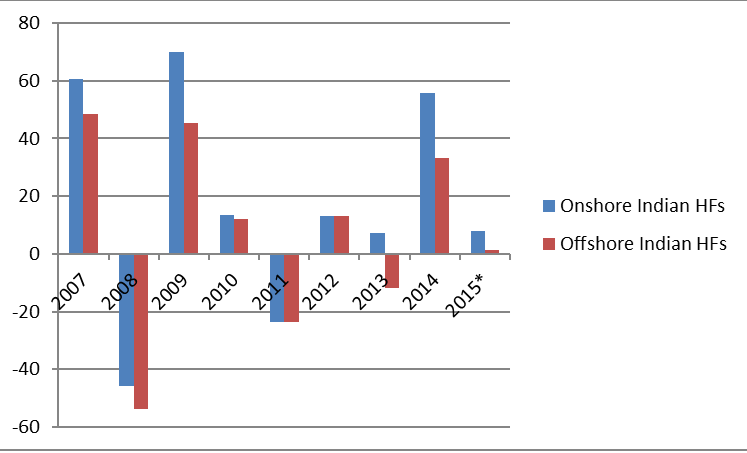The first modern hedge fund was started by Australia based sociologist, author and financial journalist Alfred Winslow Jones in 1949. His fund followed three rules: 1) Always maintain short positions 2) Always be leveraged 3) Only charge an incentive fee of 20% against profits, no fixed fee. Jones called his fund hedge fund because all his long positions were covered by short positions.
Over the years, the dynamics of hedge funds have changed and fund managers have started looking beyond just short positions to generate profits. Now, they invest aggressively across assets classes by using derivatives tools to leverage.
Vikas Gupta, Executive Vice President and CIO, Arthveda says, “A hedge fund is no different from a startup; it’s like a financial startup. Over time, hedge funds have gone beyond just long/short strategy across the globe. Now fund managers use different techniques, some may even be very traditional, to run a hedge fund.”
It is a new asset class which helps diversify investor’s portfolio between equities and debt funds. Hrishikesh Parandekar, CEO, Ambit Finvest says, "It gives a great opportunity for investors to create a new asset class between equity and debt, earning a good yield with lower volatility.”
Ticket size and target audience
Hedge funds fall under the SEBI AIF category III. They accept a minimum initial investment of Rs. 1 crore and are required to have a corpus of Rs. 20 crore. Additionally, the sponsor of the fund has to put in a seed capital of 5% or Rs. 10 crore, whichever is less. This means for the smallest possible hedge fund of Rs. 20 crore, the sponsor must invest at least Rs. 1 crore.
Since the minimum investment requirement in hedge funds is Rs. 1 crore, such funds are typically meant for ultra HNIs. Apart from HNIs, many corporate treasuries are also showing an appetite for hedge funds to diversify their portfolios, say fund managers.
Fee structure
Normally, the fee structure adopted across the globe is 2-20, where 2% is the management fee and 20% is incentive fee/performance fee. But the structure varies across funds. For instance, it can be 1-10, where 1% is the management fee and 10% is the incentive fee or 0-15 where no management fee is charged a 15% is the performance fee.
Benefits to distributors
The management fee charged by a hedge fund to investors is shared between the distributor and the fund. The fee is negotiable but normally 30-40% of management fee is offered as commission to distributors, say experts.
Existing funds in the market
In India, there are many funds which classify as hedge funds or absolute returns funds that normally take long/short positions in the market. Ambit Capital, Edelweiss Capital, DSP BlackRock AIF and Redart Capital are among the prominent firms that are running hedge funds in India.
The performance data of such funds is not available in the public domain. In an interview with Hindu Business Line, Andrew Holland, CEO, Ambit Investment Advisors claimed that his hedge fund has delivered 7% returns when Nifty was down by 7% during April-September 2015.
But you can’t compare the returns of a hedge fund with an index because hedge funds gives returns in absolute terms.
We can compare such funds with other funds in the same category. According to data compiled from hedge-fund tracker Eureka Hedge, India based hedge funds have outperformed global hedge funds who invest in India via offshore route.
Performance of onshore and offshore hedge funds

*India-focused hedge funds based in the country have typically outperformed those based outside the country. (Returns are given in percentage terms).
Tax
The Category III AIF trusts are taxed in accordance with trust taxation rules which are complex and lead to uncertainty in tax treatment for AIFs and its investors. Andrew Holland, CEO of Ambit Investment Advisors says, “Taxation policy is one the biggest hurdle for hedge funds in India”
Conclusion
The total assets managed by all India-dedicated hedge funds is $3.6 billion, of which $3.2 billion or 89% is managed by managers based outside India. This is a miniscule portion of the global hedge fund industry which manages $2.24 trillion, shows hedge-fund tracker Eureka Hedge.
Hedge funds are relatively new and unexplored in Indian markets and have a lot of potential to grow, believe experts. This is evident by the rapid growth in assets in this category. SEBI data shows that hedge funds raised Rs. 1,498 crore in December which increased to Rs. 4,553 crore in December 2015.



